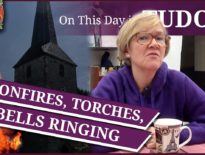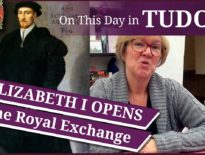On this day in Tudor history, 24th January 1555, in the reign of Queen Mary I, a great joust was held at Westminster between English and the Spanish knights. It was one of the events planned by Philip of Spain, Queen Mary I's husband, to try and tackle the problems between Englishmen and Spaniards in London. Tensions had even led to violence and murder.
Find out more about the problems, and how King Philip tried to tackle them, in today's talk.
Also on this day in Tudor history, 24th January 1536, the forty-four-year-old King Henry VIII had a jousting accident at Greenwich Palace. Find out more in last year's video:
Also on this day in history:
- 1502 – Henry VII ratified a peace treaty, the Treaty of Perpetual Peace, with James IV of Scotland. Part of this treaty was the agreement of a marriage between Henry VII's daughter, Margaret, and James.
- 1503 – The foundation stone of King Henry VII's chapel was laid at Westminster Abbey.
- 1566 – Death of Rowland Meyrick, Bishop of Bangor. He was buried at Bangor Cathedral.
- 1597 – Death of Thomas Molyneux, Elizabeth I’s Chancellor of the Court of Exchequer, and Receiver of Customs and Imposts on Wines, in Dublin. He was buried in Dublin's Christ Church Cathedral.
- 1634 – Death of Nathaniel Giles, composer, Organist and Choir master at St George's Chapel, Windsor and the Chapel Royal. He was Choir Master at Windsor for forty-nine year. A memorial tablet to him can be found on the floor of Rutland Chapel in St George's Chapel.
Transcript:
On this day in Tudor history, 24th January 1555, in the reign of Queen Mary I, a great joust was held at Westminster between English and the Spanish knights.
Merchant-Tailor and citizen of London, Henry Machyn, recorded it in his diary, writing “The 24th day of January there were great running at the tylt at Westmynster with spears, both English men and Spaniards.”
There were Spaniards there because Queen Mary I had married Philip of Spain, son of Charles V, Holy Roman Emperor, in July 1554 and Philip had obviously brought Spaniards over to England with him.
Philip was a keen sportsman, but he also, as historian David Loades pointed out in his book “Intrigue and Treason: The Tudor Court, 1547-1558”, wanted to build bridges between his Spanish household and the English aristocracy, particularly as there was some anti-Spanish feeling in London at the time and trouble between Spaniards and Englishmen. Mary may have rallied the citizens of London against Wyatt and his men earlier that year, but that didn’t mean that her marriage to Philip was popular with her people and courtiers. Machyn recorded in his diary that on 26th October a Spaniard was hanged at Charing Cross for killing a servant of Sir George Gifford by Temple Bar, and on 4th November 1554, there was “a great fray at Charing Cross at 8 of the clock at night between the Spaniards and Englishmen, the which through wisdom there were but a fewe hurt”.
What better way to bring Spaniards and English courtiers together than sports like jousting?
On 18th December 1554, Machyn recorded that there “was a grett tryhumph at the court gatte, by the Kyng and dyvers lordes boyth English-men and Spaneards, the wyche the Kyng and his compene [were] in goodly harnes, and a-pon ther armes goodly jerkyns of bluw velvett, and hosse in-brodered with sylver and bluw sarsenett; and so thay rane on fott with spayrers and swerds at the tornay, and with dromes and flutes in whyt velvet [drawn] owt with blu sarsenett, and ther wher x aganst [the King] and ys compene, the wher xviij in odur colers.”
But there was more trouble to come. On New Year’s Day 1555, some “insolent and drunk Spaniards” caused “great uproar” with some wh*res in the cloisters of Westminster Abbey. They’d left other Spaniards guarding the passageway while they had their fun, and there was violence when the Dean’s men encountered them. John Strype records “some of the Dean's men happened now to come into the cloister, at whom these Spaniards discharged their pistols, and wounded some of them: whereat began a fray. A Spanish friar gets presently into the church, and rings the bell for alarm. This called all the street together, and much blood had like to have been spilt. But the tumult at length ceased, and no more harm done than the great fright and disturbance which it occasioned.” Phew! But 8 days later, Henry Machyn recorded that “certain Spaniards killed an Englishman basely: two held him while one thrust him through, and so he died.”
So, the 24th January jousts were important for bringing the two sides together. David Loades also notes that Philip “honoured the nuptials of one of his English chamberlones,, Lord Strange, with a tournament, banquet, masque and juego de cañas”, in which he participated. This was a diplomatic move from Philip, showing that he was making an effort with the English courtiers. By the way, I looked up juego de cañas, or game of canes, and it appears to be a sport where teams on horseback threw cane javelins at each other. The riders had to doge or deflect these javelins. A bit different to jousting.
Philip himself was also recorded as running at the tilt against other Spaniards on the 19th March, probably practising for the big joust organised for Lady Day, 25th March, which Machyn also recorded:
“The 25 day of Marche, the which was our lady [day,] there was as great jousts as you have seen at the tilt at Westmynster; the challengers was a Spaniard and Sir George Howard; and all their men, and their horses trimmed in white, and then came the King and a great many all in blue, and trimmed with yellow, and their helmets with great tufts of blue and yellow feather, and all their whifflers and their footmen, and their armorers, and a company like Turks rode in crimson satin gowns and capes, and with falchions, and great targets; and some in green, and many of diverse colours; and there was broken 200 staffs and above.”
It must have been a wonderful sight.
So English and Spanish relations could be difficult at times, but it appears that Philip of Spain tried his best to bring the two sides together in fun events.



Oh dear, trouble, strife, toil and trouble! Who won? The old English in the source was hard to work out who won.